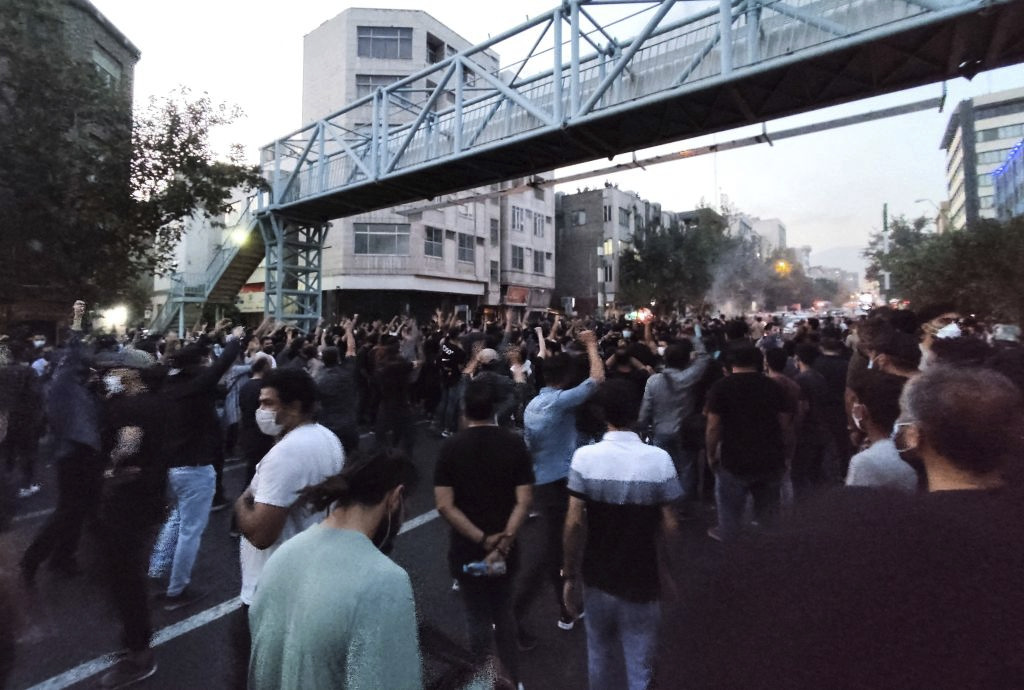Biden Administration’s Inaction Legitimizes Iran’s Brutality

Reports from the Oslo-based non-governmental organization Iran Human Rights state that in recent anti-regime protests, 326 people have died and 15,000 have been arrested. Executions have already begun.
The least the Biden administration can do to show support for the Iranian people is immediately to convene a session at the United Nations to address the ruling mullahs’ gruesome crackdown.
Is the Biden administration not taking action because they are concerned that it may scuttle the prospects of the reviving the nuclear deal with the ruling mullahs later?
Continuing to back the nuclear deal by refusing to declare it dead — permanently — sends the message to the Iranian people: that the West does not care about, or stand with, their struggles against a savage dictatorship.
The Biden administration needs to stop all negotiations that could lead to economic, financial or political benefits for the Iranian regime.
Another path that the Biden administration could take is immediately to initiate the process of restoring UN sanctions against the Islamic Republic.

Reports from the NGO Iran Human Rights state that in recent anti-regime protests, 326 people have died and 15,000 have been arrested. Executions have already begun. The least the Biden administration can do to show support for the Iranian people is immediately to convene a UN session to address the ruling mullahs’ gruesome crackdown. Pictured: Iranians protest the death of 22-year-old Mahsa Amini in police custody, in Tehran on September 21, 2022. (Photo by AFP via Getty Images)
As Winston Churchill pointed out, “I never ‘worry’ about action, but only about inaction”.
The Biden administration’s inaction has only been legitimizing the Iranian regime’s savage crackdown on its population, and sending a message to the Iranian people that Washington does not stand with them or with their aspirations for establishing a democratic system of governance; rule of law and justice; freedom of speech, of the press and of assembly; and human rights for all.
Iranians have been protesting for nearly two months while risking their lives every hour. They have been chanting “Death to the dictator”, “Death to [Supreme Leader Ali] Khamenei” and “This year is a year of blood, Seyyed Ali [Khamenei] will be gone”.
Reports from the Oslo-based non-governmental organization Iran Human Rights state that in recent anti-regime protests, 326 people have died and 15,000 have been arrested. Executions have already begun.
According to the United Nations Office of the High Commissioner for Human Rights:
“Some sources suggest that as many as 23 children have been killed and many others injured in at least seven provinces by live ammunition, metal pellets at close range, and fatal beatings. A number of schools have also been raided, and children arrested by security forces. Some principals have also reportedly been arrested for not cooperating with security forces. On 11 October, the Minister of Education confirmed that an unspecified number of children had been sent to ‘psychological centres’ after they were arrested allegedly for participating in anti-State protests.”
The least the Biden administration can do to show support for the Iranian people is immediately to convene a session at the United Nations to address the ruling mullahs’ gruesome crackdown.
As Amnesty International’s director for the Middle East and North Africa, Heba Morayef, pointed out:
“The Iranian authorities’ reckless and unlawful use of firearms against protesters, including live ammunition, reveals yet again the tragically high cost of international inaction. All member states of the UN Human Rights Council must take decisive action now and immediately convene a special session on Iran in order to prevent further loss of life. Failure to act decisively will only embolden the Iranian authorities to further crackdown against mourners and protesters set to gather in the coming days during commemorations marking 40 days since the first deaths of protesters after the deadly repression began in mid-September. “
Is the Biden administration not taking action because they are concerned that it may scuttle the prospects of the reviving the nuclear deal with the ruling mullahs later?
In spite of US Special Envoy for Iran Robert Malley’s recently having said that the White House is not going to “waste our time” on the nuclear deal “if nothing’s going to happen,” he nevertheless stressed that the Biden administration is still committed to employing diplomacy, presumably to revive the deal granting Iran’s mullahs unlimited nuclear weapons at a later date.
The nuclear deal is also expected to lift sanctions on the Iranian regime, an act that would empower Iran’s destabilizing rulers with a trillion dollars and further empower them in to “export the Revolution” — as they do by force or threats of force, as in Yemen, Lebanon, the Gaza Strip and Iraq.
Continuing to back the nuclear deal by refusing to declare it dead — permanently — sends the message to the Iranian people: that the West does not care about, or stand with, their struggles against a savage dictatorship.
The Biden administration needs to stop all negotiations that could lead to economic, financial or political benefits for the Iranian regime.
Another path that the Biden administration could take is immediately to initiate the process of restoring UN sanctions against the Islamic Republic.
When the Joint Comprehensive Plan of Action (JCPOA), the “Iran nuclear deal,” was struck in 2015 during the Obama administration, the parties agreed to lift the UN sanctions against the Iranian regime. The ruling mullahs used the revenues that poured in to further engulf their regional neighbors, noted above.
One of the rounds of sanctions came through UN Security Council Resolution 1929, which tightened the grip on Iran’s financial dealings and banned Iran from buying heavy weapons. Another set of sanctions, UNSC Resolution 1803, imposed restrictions on Iranian bank transactions and called on countries to inspect Iranian ships and cargo planes where there were reasonable grounds to believe that the regime was smuggling prohibited products.
A provision within UNSC Resolution 2231 allows such a course of action. To invoke this provision, “a JCPOA participant state” can notify the UNSC that there has been a “significant non-performance of commitments under the JCPOA.” According to the agreement, any signatory party can trigger a 30-day countdown to a “snapback” that would restore all UN sanctions on Iran, including an arms embargo, if Tehran is found to be failing to meet its obligations — which it is. In other words, the US, Germany, France or the UK could trigger the sanctions snapback provision of the nuclear deal.
Reimposing UN sanctions on the Iranian regime and taking a far tougher stance towards the ruling mullahs will send a strong message to the protesters that the US stands with them. Currently, the Biden administration’s passivity is only serving to contaminate its legacy as an appeaser of China, Venezuela, Russia and other despots, while empowering and emboldening the ruthless mullahs of Iran.

























